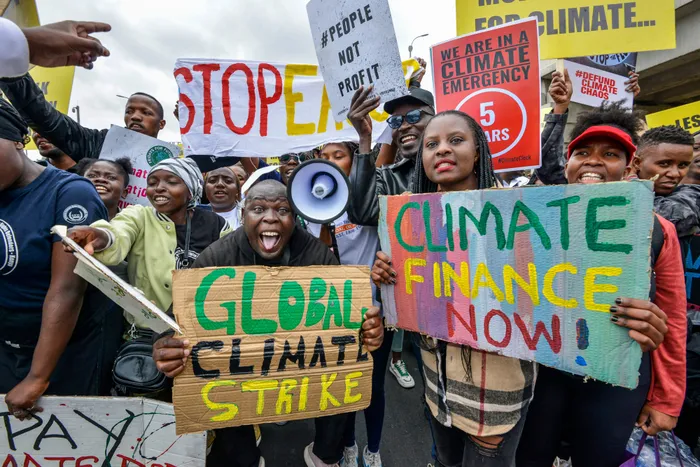Pursuing a just and equitable transition for Africa

Picture: Suleiman Mbatiah AFP - Climate activists hold placards and chant slogans as they take part in a march in Nairobi on September 4, 2023. The activists from various nationalities urged delegates attending the Africa Climate Summit in Nairobi to engage actively in discussions to expedite the phase-out of fossil fuels.
By Naledi Ramontja
The curtains have closed on the African Climate Change Summit, leaving us to reflect on its outcomes and, most importantly, its potential impact on averting the impending climate crisis.
As the world grapples with the pressing issue of climate change, the African Climate Change Summit was a crucial moment for Africa to take centre stage in the global effort to combat this existential threat. Now that it’s over, we must ask ourselves: Was it worth it? Will it help us avert climate change?
The summit , marked by the presence and participation of top government officials, leaders, experts, activists and various stakeholders from across the world. Its significance cannot be understated as Africa is one of the regions most vulnerable to the effects of climate change, yet overlooked when it comes to global climate discussions.
This time, the summit was a success in bringing African voices to the forefront and raising awareness about unique challenges faced by the continent as a result of climate change. Africa has long been at the forefront of this global pandemic with extreme weather events, shifting rainfall patterns, and increasing temperatures affecting the lives and livelihoods of millions. The African Climate Summit recognised the realities and set a new course for collective action.
One of the most remarkable aspects of the summit was its inclusivity. It provided a platform for African nations, big and small, to voice their concerns and share their innovative solutions with the world. It was a space where countries could learn from one another, leveraging their experiences to develop relevant strategies for climate mitigation and adaptation.
The summit addressed key issues, such as renewable energy, reforestation, sustainable agriculture, and the protection of Africa’s unique ecosystems. The summit highlighted the importance of accountability and transparency in pursuing a just and equitable transition, as well as the need for countries that have contributed the most to climate change to take the lead in financing and implementing climate action.
The discussions were not limited to policy and governance; they also delved into practical solutions. For instance, discussions on renewable energy showcased Africa’s immense potential in renewable energy and ensuring energy access for all. Moreover, the summit recognised the importance of Africa’s youth, who were also represented in youth-led initiatives and the presentation of the Youth Declaration, highlighting the role of young Africans as climate champions and leaders.
It further underscored the need for continued global co-operation. African leaders called for more significant contributions from developed nations and emphasised the importance of technology transfer and capacity building to support African countries in their climate efforts.
The summit saw the largest mobilisation of African civil society organisations that rallied for outcomes that put African people first. It sent a strong message to the world that the continent was serious about addressing climate change. It was a reminder that while Africa might be disproportionately affected by climate change, it is also home to some of the most resilient and resourceful communities on the planet.
The summit showcased the innovation, determination and resilience of Africans who are determined to protect their environment and secure a better future for generations to come.
One of the summit’s most significant achievements was the commitment to increase funding for climate initiatives in Africa and prospects of green growth. The UK, US, Canada, Finland and the Africa Development Bank committed $1bn towards adaptation, and $25bn in climate financing by 2025. Denmark announced a $232m pledge for the Green Climate Fund’s second replenishment. While other European countries, such as Germany, pledged several financing and debt swops for green projects. The financial backing is essential for turning ideas into action on the ground.
The ultimate commitment was the signing of the Nairobi Declaration, which outlines Africa’s position on climate change, commitments, and calls for action. Hopefully, the declaration will leverage some ground of negotiation and African common position in other climate meetings and in the upcoming 2023 28th Climate Conference of the Parties of the UNFCCC (COP28).
Despite the positive steps taken, there are criticisms, including the lack of representation from African nations, lack of engagement with communities and indigenous people who are most affected by climate change, and failure to set a clear African agenda and position in terms of the need to restructure global financial systems. There were also concerns from civil society organisations regarding “Western” interests hijacking the event and dominating discussions.
The shift in focus was rather unusual in such events. The absence of leaders from some of Africa’s major economies, including Nigeria, Egypt, Morocco, South Africa, Angola and Ethiopia did not do justice to what is known as the continent’s meeting on climate crisis. In fact, only 14 out of 54 heads of state attended the summit, this can only mean that African participation in discussions was limited.
For me, the summit served as a platform to inform, frame and influence commitments, and pledges to deal with the climate crisis in a continent that contributes less than 10% of global emissions, yet suffers the brunt of extreme weather as a result of climate change.
With the expectation of escalating climate crises in terms of frequency and intensity, urgent action is required to address climate change and build climate resilience. The question remains, will the lofty ideals presented translate into better lives for Africans, and will the funds donated fulfil their intended purpose? And will the resources be used to uplift the continent? The truth is the real work lies ahead in translating the commitments into meaningful action.
*Ramontja is with the Institute for Pan-African Thought and Conversation at the University of Johannesburg.